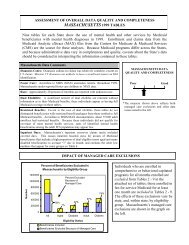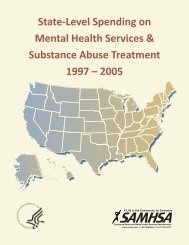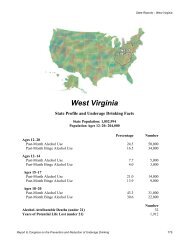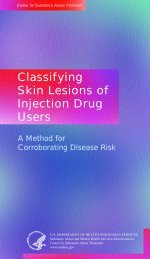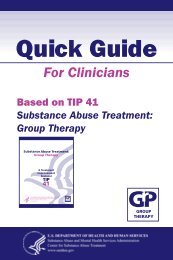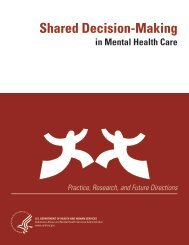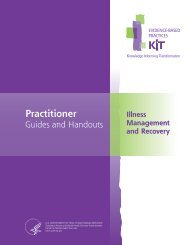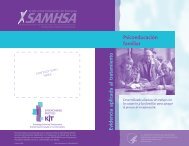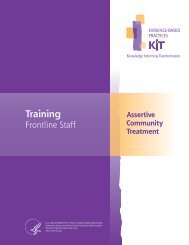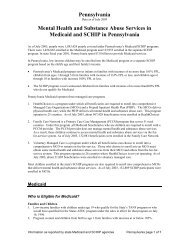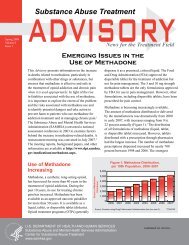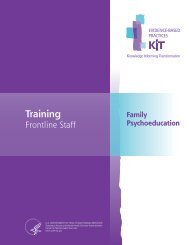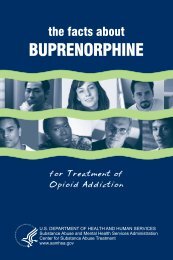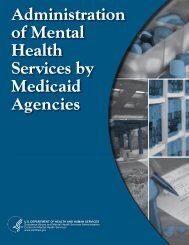TAP 21 - SAMHSA Store - Substance Abuse and Mental Health ...
TAP 21 - SAMHSA Store - Substance Abuse and Mental Health ...
TAP 21 - SAMHSA Store - Substance Abuse and Mental Health ...
Create successful ePaper yourself
Turn your PDF publications into a flip-book with our unique Google optimized e-Paper software.
Addiction Counseling Competencies<br />
In addition to its own work, the National Curriculum Committee reviewed <strong>and</strong> incorporated<br />
other publications on the work of addiction counselors. 1 In 1995 the committee’s work<br />
resulted in the ATTC publication Addiction Counselor Competencies. Subsequent to this<br />
publication, the ATTCs conducted a national survey to validate the competencies (see appendix<br />
C). Results supported virtually all of the competencies as being essential to the professional<br />
practice of addiction counseling.<br />
In 1996, the International Certification <strong>and</strong> Reciprocity Consortium (ICRC) convened a national<br />
leadership group to evaluate the need for model addiction counselor training. After careful<br />
deliberation, the group concluded that much of the work to define such a curriculum st<strong>and</strong>ard<br />
had already been accomplished by the ATTC National Curriculum Committee <strong>and</strong> the ICRC in<br />
the National Curriculum Committee’s Addiction Counselor Competencies <strong>and</strong> the ICRC’s 1996<br />
Role Delineation Study, 2 respectively.<br />
Soon after, CSAT agreed to fund a collaborative effort to finalize a document that could be used<br />
as a national st<strong>and</strong>ard. CSAT convened a panel—The National Steering Committee for Addiction<br />
Counseling St<strong>and</strong>ards (NSC)—that comprised representatives from five national educational,<br />
certification, <strong>and</strong> professional associations. The NSC was successful in achieving unanimous<br />
endorsement of the Addiction Counselor Competencies—a milestone in the addiction<br />
counseling field.<br />
Based on this foundation, the National Curriculum Committee began to delineate the KSAs<br />
that undergird each competency statement. Input was solicited from a number of key national<br />
organizations <strong>and</strong> selected field reviewers. In 1998 CSAT published the results of this groundbreaking<br />
work as <strong>TAP</strong> <strong>21</strong> (The Competencies).<br />
After <strong>TAP</strong> <strong>21</strong> was published, the National Curriculum Committee systematically conducted<br />
focus groups <strong>and</strong> a national survey to elicit feedback from the field about the impact of <strong>TAP</strong> <strong>21</strong>.<br />
Although feedback was uniformly positive <strong>and</strong> thous<strong>and</strong>s of copies of <strong>TAP</strong> <strong>21</strong> were disseminated<br />
through <strong>SAMHSA</strong>’s NCADI <strong>and</strong> the ATTC Network, refinements were needed to improve the utility<br />
of the publication <strong>and</strong> enhance its effect in both the addiction practice <strong>and</strong> educational systems.<br />
Feedback obtained from the survey <strong>and</strong> the focus groups indicated a need for additional information<br />
to help the field incorporate the competencies into daily practice. Feedback also suggested<br />
that there was no need to change the competencies. The most common suggestions were to<br />
refine the 1998 publication by presenting the content in a more user-friendly fashion <strong>and</strong> linking<br />
it to professional literature <strong>and</strong> specific applications. The National Curriculum Committee revised<br />
<strong>TAP</strong> <strong>21</strong> in 2000 based on the feedback of dedicated addiction practice <strong>and</strong> education professionals;<br />
however, this revision was never published.<br />
A new Update Committee was convened in 2005 to update the revised 2000 edition with literature<br />
published between 2000 <strong>and</strong> 2005. The Update Committee consisted of some of the original<br />
members from the National Curriculum Committee; representatives from NAADAC—The Association<br />
for Addiction Professionals, CSAT, the Center for <strong>Mental</strong> <strong>Health</strong> Services, the Center for<br />
<strong>Substance</strong> <strong>Abuse</strong> Prevention, the National Association for Children of Alcoholics, <strong>and</strong> the Annapolis<br />
Coalition; treatment providers; <strong>and</strong> experts in addiction research. The current updated edition<br />
retains all of the feedback-based improvements of the 2000 revised version <strong>and</strong> adds relevant<br />
2<br />
1<br />
Birch <strong>and</strong> Davis Corporation (1986). Development of Model Professional St<strong>and</strong>ards for Counselor Credentialing. Dubuque, IA:<br />
Kendall/Hunt Publishing.<br />
2<br />
International Certification <strong>and</strong> Reciprocity Consortium (ICRC)/Alcohol <strong>and</strong> Other Drug <strong>Abuse</strong> (1991). Role Delineation Study for<br />
Alcohol <strong>and</strong> Other Drug <strong>Abuse</strong> Counselors. Raleigh, NC: ICRC.



